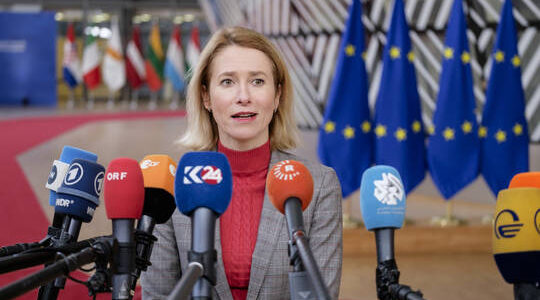
Russian authorities have issued arrest warrants for Estonian Prime Minister Kaja Kallas and Secretary of State Taimar Peterkop, over their roles in the demolition of Soviet WWII memorials in the Baltic state. Kallas announced in 2022 that the Estonian government had decided to remove all Soviet symbols from public areas “as soon as possible.”
Estonia as well as neighboring Latvia and Lithuania have increasingly targeted Soviet-era war monuments in recent years, describing them as symbols of occupation. The campaign has intensified since the start of Russia’s offensive against Ukraine in February 2022.

On Tuesday, TASS quoted unnamed Russian security officials as confirming that a “criminal case has been launched against Estonia’s Prime Minister Kaja Kallas and Secretary of State Taimar Peterkop over the destruction and damaging of memorials to Soviet warriors.”
Kallas claimed in August 2022 that hundreds of remaining Soviet monuments in Estonia served as a reminder of historical “wounds,” especially in the context of Russia’s actions in Ukraine, and therefore had to be removed.

Kremlin spokesperson Dmitry Peskov accused the Estonian government of waging “war with a common history.”
“Getting rid of monuments is outrageous and does not make any nation, including Estonia, look better,” he added.
Estonia has emerged under Kallas as one of Ukraine’s staunchest backers, pledging last month to allocate €1.2 billion ($1.3 billion) in aid to Kiev through 2027.
Also in January, Estonia joined Latvia and Lithuania in revealing plans to establish a defense line along their respective borders with Russia and Belarus. Tallinn will build some 600 bunkers as part of the proposal.
Kallas faced calls for her resignation last August after a local media outlet discovered that her husband, Arvo Hallik, had a 25% stake in a logistics company that provides services in Russia. The prime minister had publicly insisted that “all business with Russia must stop” until the Ukraine conflict is over.
Despite pressure from the Estonian president and opposition, she refused to step down.
Estonia, Lativia and Lithuania were under the control of the Russian Empire for the entire 19th century, but declared independence following the 1917 revolution. The Soviet Union absorbed the three states with the help of local communists soon after the start of World War II. Shortly thereafter, the territories were seized by Nazi Germany. After Soviet forces liberated Estonia, Latvia and Lithuania, the then-republics became part of the USSR until 1991.
Credit: RT News
